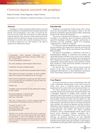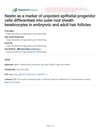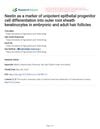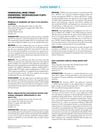 November 2023 in “Linköping University medical dissertations”
November 2023 in “Linköping University medical dissertations” Keratinocytes and adipose-derived stem cells can effectively heal difficult skin wounds.
 June 2023 in “Dermatology reports”
June 2023 in “Dermatology reports” The link between pemphigus and the patient's scarring hair loss is still unclear.
 September 2022 in “Frontiers in genetics”
September 2022 in “Frontiers in genetics” A Chinese male with a new genetic mutation has a skin condition and severe urinary issues, with treatments having mixed success.
 September 2022 in “Research Square (Research Square)”
September 2022 in “Research Square (Research Square)” Increasing Rps14 helps grow more inner ear cells and repair hearing cells in baby mice.
 June 2022 in “Research Square (Research Square)”
June 2022 in “Research Square (Research Square)” Nestin-expressing cells turn into a specific type of skin cell in hair follicles during development and in adults.
 May 2022 in “Research Square (Research Square)”
May 2022 in “Research Square (Research Square)” Nestin marks cells that can become a specific type of skin cell in hair follicles of both developing and adult mice.

Researchers found a genetic link for hereditary hair loss but need more analysis to identify the exact gene.
 January 2020 in “Medical journal of clinical trials & case studies”
January 2020 in “Medical journal of clinical trials & case studies” A 37-year-old male with severe skin and internal issues has a rare inherited skin condition called dystrophic epidermolysis bullosa.

PlacMA hydrogels from human placenta are versatile and useful for cell culture and tissue engineering.
 October 2019 in “Skin appendage disorders”
October 2019 in “Skin appendage disorders” The vitreous membrane in hair follicles changes shape during the hair cycle and may affect hair growth and nutrient exchange.
 August 2019 in “Stem cells”
August 2019 in “Stem cells” New treatments for hair loss, fertility, and wound healing are being explored.
 January 2019 in “Springer Reference Medizin”
January 2019 in “Springer Reference Medizin” Follicle Stimulating Hormone is important for fertility.
 September 2018 in “Cosmetics”
September 2018 in “Cosmetics” Inositol and arginine solutions improve hair follicle health and turnover.
 April 2018 in “Journal of Investigative Dermatology”
April 2018 in “Journal of Investigative Dermatology” Ginsenoside Rd may help improve skin aging by increasing collagen in the skin.
 April 2018 in “Journal of Investigative Dermatology”
April 2018 in “Journal of Investigative Dermatology” Aging reduces skin cell renewal and defense against germs due to TGFbeta, but blocking TGFbeta could help restore these functions.
 April 2018 in “Journal of Investigative Dermatology”
April 2018 in “Journal of Investigative Dermatology” Removing STAT5 from 3D-cultured human skin cells reduces their ability to grow hair.
 April 2018 in “Journal of Investigative Dermatology”
April 2018 in “Journal of Investigative Dermatology” Kaempferol helps skin stem cells grow and may improve skin thickness due to its 3-OH group.
 January 2017 in “Springer eBooks”
January 2017 in “Springer eBooks” The document explains various skin conditions and their treatments.

Tissue from dog stem cells helped grow hair in mice.
 January 2016 in “SpringerBriefs in bioengineering”
January 2016 in “SpringerBriefs in bioengineering” Genetic defects and UV radiation cause skin damage and aging.
 January 2016 in “Elsevier eBooks”
January 2016 in “Elsevier eBooks” The conclusion is that grasping how cells determine their roles through evolution is key, with expected progress from new research models and genome editing.
 August 2015 in “MOJ proteomics & bioinformatics”
August 2015 in “MOJ proteomics & bioinformatics” ePUKs could be valuable for regenerative medicine due to their wound healing abilities.
 January 2015 in “Hair therapy & transplantation”
January 2015 in “Hair therapy & transplantation” Some botanical products may help increase hair growth in people with alopecia, but more research is needed.

Keratin hydrogels from human hair show promise for tissue engineering and regenerative medicine.
 September 2013 in “Regenerative Medicine”
September 2013 in “Regenerative Medicine” γδ T cells help with hair growth during wound healing in mice.

Wound healing is complex and requires more research to enhance treatment methods.
 November 2008 in “Medical & surgical dermatology”
November 2008 in “Medical & surgical dermatology” A device was made in 2008 to measure hair loss severity. Other findings include: frizzy mutation in mice isn't related to Fgfr2, C/EBPx marks preadipocytes, Cyclosporin A speeds up hair growth in mice, blocking plasmin and metalloproteinases hinders healing, hyperbaric oxygen helps ischemic wound healing, amniotic membranes heal wounds better than polyurethane foam, rhVEGF165 from a fibrin matrix improves tissue flap viability and induces VEGF-R2 expression, and bFGF enhances wound healing and reduces scarring in rabbits.
 April 2008 in “Medical & surgical dermatology”
April 2008 in “Medical & surgical dermatology” Certain hairstyles can cause scalp diseases, smoking is linked to hair loss, 5% minoxidil foam is effective for hair loss treatment, and various factors influence wound healing and hair growth.
 October 2007 in “Journal of Investigative Dermatology”
October 2007 in “Journal of Investigative Dermatology” The document suggests a bacteria plays a significant role in acne rosacea and that white hair can regain color after transplant, meriting more research on reversing grey hair.
 August 2004 in “Journal of the American College of Surgeons”
August 2004 in “Journal of the American College of Surgeons” Several genes, including Hox-7A, Stra6, and Lim-1, are involved in normal palate formation.






























